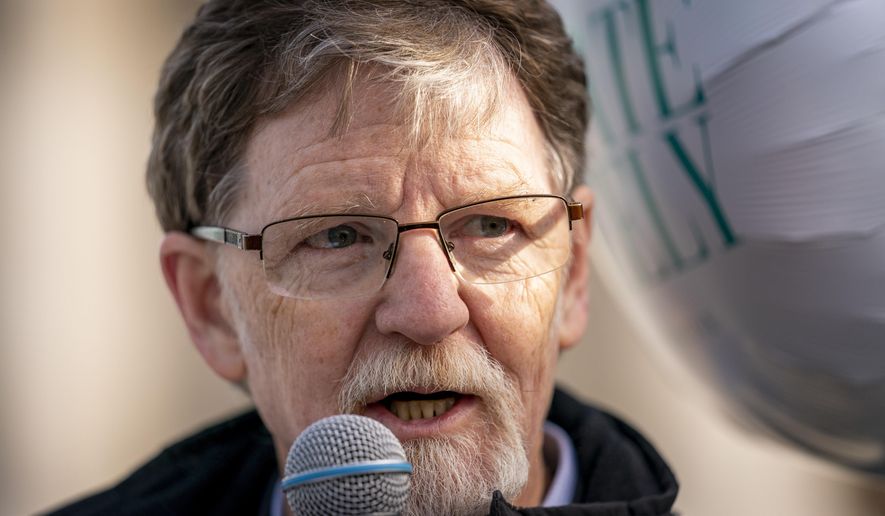Christian baker Jack Phillips asked the Colorado Supreme Court this week to reject a case against him after the Supreme Court affirmed the First Amendment right of artists who turn down work that would entail creating content that would contradict their religious beliefs.
Mr. Philips has been engaged in litigation for years after he refused to make a cake to celebrate a same-sex wedding. He was sued under Colorado’s public accommodations law that protects certain groups from discrimination, including those based on sexual orientation.
His case went to the Supreme Court more than five years ago where he had a narrow win — but ultimately, the justices sent his case back to lower courts for further evaluation.
In the meantime, an attorney issued another request to Mr. Phillips asking him to create a gender transition cake that was pink on the inside but blue on the outside. He refused and the attorney sued again under the same law.
Mr. Phillips’ attorneys, though, just won a challenge to the same Colorado law, representing a Christian web designer, Lorie Smith, who refused to build wedding websites for same-sex marriages.
The case was 303 Creative v. Elenis and it challenged the same state law plaguing Mr. Phillips. The win for Ms. Smith was viewed by court watchers as a landmark First Amendment victory against LGBTQ rights.
The high court in the 6-3 decision said the government can’t force individuals to speak or create messages in a way that runs afoul of their beliefs. The opinion, though, detailed Ms. Smith’s free speech rights to create expressive work.
Legal experts say lower courts will have to grapple with whether bakers and florists and other industries qualify as expressive work to enjoy the same protections as Ms. Smith.
Pointing to the new high court precedent, though, Mr. Phillips’ attorneys told the Colorado Supreme Court it must honor Mr. Phillips’ right to decline to make a gender transition cake.
“When citizens face speech choices they don’t like, ‘our Nation’s answer’ is ‘tolerance, not coercion,’” Mr. Phillips’ attorneys wrote in their Tuesday filing, quoting from the June Supreme Court’s ruling. “303 Creative controls here. Given its clarity, Petitioners ask this Court to grant review, vacate the decision below, and enter judgment for Petitioners.”
The Colorado Civil Rights Commission sued Mr. Phillips several years ago, arguing Mr. Phillips was refusing a service in violation of Colorado’s public accommodations law. The case made it to the court in 2017.
Mr. Phillips argued that his cakes amounted to First Amendment speech and that forcing him to create a cake for a same-sex wedding violated his religious rights.
The Supreme Court ruled that the commission showed undue animosity toward Mr. Phillips and sent the case back to a lower court, but the justices shied away from a broad ruling on constitutional principles.
The issue percolated without further guidance until Ms. Smith brought her case to the high court.
Kristen Waggoner, leader of Alliance Defending Freedom, represented Mr. Phillips and Ms. Smith. She said the ruling on wedding websites will help the baker as he continues legal battles over custom cake designs.
“States like Colorado cannot eliminate beliefs they do not like,” Ms. Waggoner said. “It’s a broad ruling. We are thrilled.”
The office of Colorado Attorney General Philip J. Weiser said they decline to comment.
Correction: The wrong byline was used in a previous version of this story.
• Alex Swoyer can be reached at aswoyer@washingtontimes.com.




Please read our comment policy before commenting.